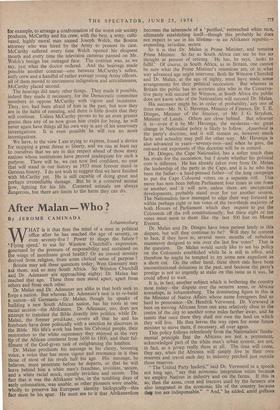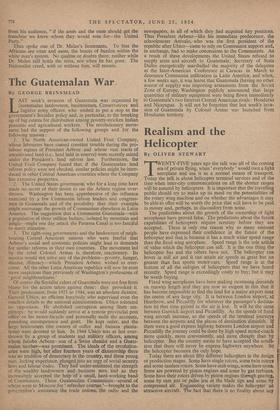After Malan — Who ?
By JEROME CAMINADA Johannesburg WHAT is it that fires the mind of a man in political office after he has reached the age of seventy, or even seventy-five ? Power to shape the future ? `Flying speed,' to use Sir Winston Churchill's expression, generated by the pressure of responsibility and sustained on the wings of inordinate good health? ,Or an inward serenity derived from religion, from some clerical sense of purpose ? Britain may ask these questions today; West Germany may Ask them; and so may South Africa. Sir Winston Churchill and Dr. Adenauer are approaching eighty; Dr. Malan has reached that age. These three men stand apart, apart from others and from each other.
Dr. Malan and Dr. Adenauer are alike in that both seek to forge a nation. But whereas Dr. Adenauer's task is to re-build bnation—all Germanic—Dr. Malan, though he speaks of uilding a new South African nation, has his roots in one racial section—the Afrikaners. Dr. Adenauer, too, does not attempt to translate the Bible directly into politics, while Dr. Malan, the former predikant, covers all that he and his forebears have done politically with a sanction he discovers in the Bible. His life's work has been his Calvinist people, their restoration to the white supremacy they enjoyed at the very tip of the African continent from 1650 to 1800, and their ful- filment of the God-given task of enlightening the heathen. Dr. Malan proclaims his message in his chesty, booming voice, a voice that has more vigour and resonance in it than those of most of his rivals half his age. His message, he believes, must penetrate before he departs, so that he will leave behind him a white man's franchise, inviolate, secure, and a white racial stock, equally inviolate and secure. The fact that it was the Afrikaner who, in the tumbling days of early colonisation, was unable, as other pioneers were unable, Wholly to preserve his European identity biologically—this fact must be his spur. He must see to it that Afrikanerdom becomes the tabernacle of a ' purified,' entrenched white race, ultimately establishing itself—though this probably he does not expect to see in his lifetime—in an Afrikaner republic— expanding, inviolate, secure.
So it is that Dr. Malan is Prime Minister, and remains Prime Minister. So far as South Africa can see he has no thought at present of retiring. He has, he says, ' tasks to fulfil.' Of course, in South Africa, as in Britain, one cannot be sure what the Prime Minister's intentions are, or in what way advanced age might intervene. Both Sir Winston Churchill and Dr. Malan, at the age of eighty, must have made some arrangements for their political succession. But whereas in Britain the public has an accurate idea who in the Conserva- tive party will succeed Sir Winston, in South Africa the public does not know who of the Nationalists will succeed Dr. Malan.
His successor might be, in order of probability, any one of three men—Mr. N. C. Havenga, Minister of Finance, Dr. T. E.
Donges, Minister of the Interior, or Mr. J. G. Strydom, Minister of Lands. Others are close behind. But whoever it is—even if it be Mr.- Havenga, the moderate—no great change in Nationalist policy is likely to follow. Apartheid is the party's doctrine, and it will remain so, however much facts and actuality may pull the other way. Mr. Havenga is also advanced in years--seventy-two—and when he goes, the out-and-out exponents of this doctrine will be in control.
Dr. Donges, the Cape Nationalist, has a softer touch than his rivals for the succession, but 1 doubt whether his political core is 'different. He has already taken over from Dr. Malan the leadership of the party in the Cape, and it is he who has been the father—a hard-pressed father—of the long campaign to put the Cape Coloured voters on a separate roll. This move has now been before Parliament four times in one foam or another, and it will now, unless there are unexpected developments, probably stand over for yet another session.
The Nationalists have managed to edge their way forward to within perhaps eight or ten votes of the two-thirds majority of both Houses of Parliament which they require to put the Coloureds off the roll constitutionally; but these eight or ten votes must seem to them like the last 500 feet on Mount Everest.
Dr. Malan and Dr. Donges have been patient lately in this dispute, but will they continue to be? Will they be content to face, if they have to, several more months of nebulous manoeuvre designed to win over the last few votes? That is the question. Dr. Malan would surely like to see his policy on the Coloureds established while he is still in office, and therefore he might be tempted to try some new expedient as a short cut. On the other hand, these short cuts have been unconstitutional delusions in the past, and because the party's prestige is not so urgently at stake on this issue as it was, he could afford to wait.
It is, in fact, another subject which is bothering the country most today—the dispute over the western areas, or African' townships, in Johannesburg. The dominating figure in this is the Minister of Native Affairs whose name foreigners find so hard to pronounce—Dr. Hendrik Verwoerd. Dr. Verwoerd is bent on moving Africans from one area relatively close to the centre of the city to another some miles farther away, and he insists that once there they shall not own the land on which they will live. He thus leaves the way open for some future minister to move them, if necessary, all over again. This policy follows relentlessly from the Nationalists' funda- mental principle that the Africans are not a permanent, acknowledged part of the white man's urban system; are not, in fact, as a group really there at all. The time will come, they say, when the Africans will simply live in their own reserves and travel each day to industry perched just outside those reserves.
" The United Party leaders," said Dr. Verwoerd in a speech not long ago, " say that economic integration exists because we employ Natives in industry and on the farms. If this is so, then the asses, oxen and tractors used by the farmers are also integrated in the economic life of the country because threw too are indispensable." " And," he added, amid guffaws from his audience, " if the asses and the oxen should get the franchise we know whom they would vote for—the United Party." Thus spoke one of Dr. Malan's lieutenants. To him the Africans are oxen and asses, the beasts of burden within the white man's system. No qualms or doubts there; neither while Dr. Malan still holds the reins, nor when he has gone. The Nationalist creed, with or without him, will remain.



































 Previous page
Previous page